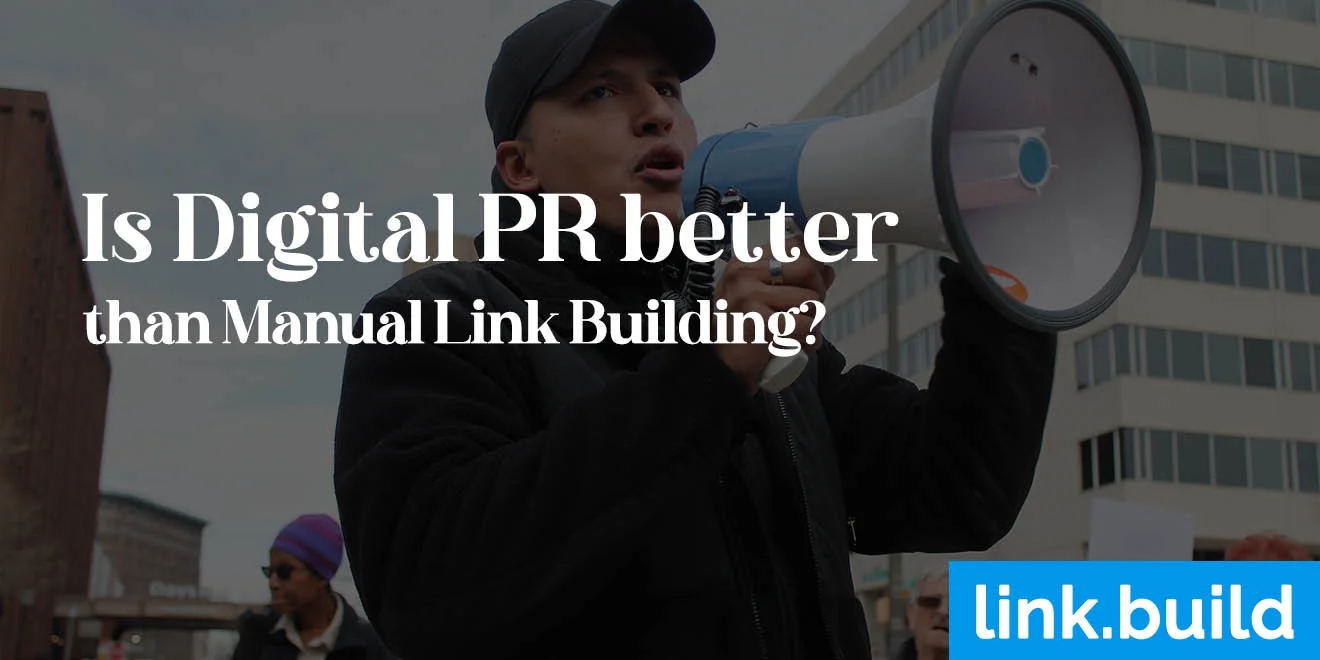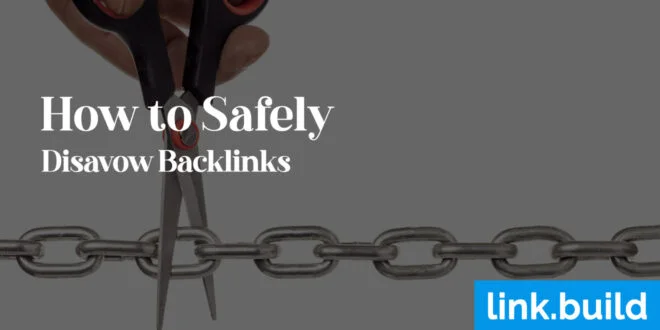Is Digital PR Better than Manual Link Building?

Everyone knows you need to build a ton of backlinks to rank in the search engines and get traffic to your site, right? Well, not always. While manual link building can be effective, it can also work against you if you acquire bad links. Unfortunately, bad links are common and even if you have a million of them, it won’t help you rank.
The problem is that most manual backlink strategies produce low-quality links. And many people still recommend strategies that result in nothing more than spam.
Many SEOs, including agencies, have been moving away from manual outreach methods because they don’t work well enough for the time and energy involved.
There is a more effective way to get links and it’s called digital PR campaign. Instead of paying and begging for links, digital PR uses media coverage to draw attention to your brand.
Digital PR is a link earning strategy where you build up your brand’s reputation as an authority in your niche so people start linking your content naturally. Many top brands have been doing this for decades and you can do it, too.
Here’s how it works in a nutshell: As a foundation, you publish valuable content; something people in your industry will find interesting enough to discuss, share, and link. As more people start visiting your site and find your content to be highly informative, your brand starts to earn a more authoritative reputation where people want to link to you because they know you’re a leader.
This method is much easier (and better) than trying to trick Google analytics into ranking your web pages through link schemes and other outdated tactics that don’t work.
If your content is truly valuable, people will share it in their social media circles and through email. Eventually it will start getting linked on other people’s websites in the following ways:
- People will reference your website specifically to find content to link because they already consider you an authority.
- People will go to your site to see what you’re all about and find quality content to link.
- As your web pages gain PageRank, your content will start showing up in search results when people are looking for resources to link in their own articles.
To make this process work, you need to publish content that delivers far more than your competitors and covers more details, provides better solutions, or is just generally more informative. Otherwise, your well-established competition will be the ones who get all the backlinks.
Digital PR efforts have snowball effect. When you earn your backlinks through publishing thought leadership pieces, you get recognized as someone important in your niche, which makes others more likely to link to your content as well. This happens because Google pays attention to the topic of the sites where you earn your links.
Over time, the backlinks you generate train search engines to consider your website to be relevant to those topics. If you get a bunch of backlinks on sites that aren’t related to your industry, Google may start to think your site isn’t relevant to your actual niche. If that happens, your web pages won’t necessarily rank high for your desired keyword phrases.
Relationships generate the best links
When you don’t have a genuine relationship with publishers, you have to work harder to get links. If you do manage to get a link, you can’t guarantee that link will stick around. Who’s to say they won’t sell you a link today for $500 and then take it down in 3 months? These transactional exchanges are sketchy at best.
Instead of creating transactional relationships where you grab as many links as you can on any site that will take your money, digital PR is founded on building relationships and generating an authoritative reputation in your niche. The former is a quick way to earn a manual penalty from Google; the latter can help your business thrive. To get links on high-authority sites that stick, people need to see you as a legitimate authority. That’s where digital PR strategies come into play.
Digital PR isn’t a new link building technique, but it’s starting to gain more traction now that Google and other search engines are using semantic search algorithms. To compete in today’s search engine results pages, you have to provide clear value or you just won’t rank. To get clicks and backlinks, you also need to be an authority.
Before discussing how to launch a digital PR backlink building strategy, here’s a refresher regarding why you should steer clear of bad links.
Bad links won’t build trust and credibility
There are two things required for your content to rank: relevance and quality. How this gets determined is up to the search engine algorithms, but you do have a considerable amount of control when creating content. However, if you’re generating bad links by the truckload, Google is going to question the quality of your content. Google’s algorithms may also question the relevance of your site if you have a bunch of links on websites that have nothing to do with your industry.
If you’re out there buying links in bulk or taking every guest post opportunity you can find, you’re spinning your wheels and wasting money in the process. Backlinks can help you earn trust and credibility, but only when they’re targeted and genuine.
If you’re throwing money at every blog owner who will let you publish a link to your site, chances are, Google knows and isn’t going to let that site pass much (if any) link juice (PageRank) to you. You also won’t get any relevant traffic, and eventually, you could get penalized by Google for buying links, which is considered link spam.
On the other hand, if you’re reaching out to websites in your niche for guest posting opportunities and your content provides value to their readers, those backlinks are probably good. However, digital PR takes this process to the next level and will be a game changer for you.
How to start a digital PR strategy to earn backlinks
By now, you’re probably wondering how you can start using digital PR to earn some powerful backlinks. We’ve outlined a basic strategy for you below.
- Publish compelling content
Earning links requires publishing content that people want to read. Compelling content holds the reader’s attention and makes them think or solves their problems. When they’re done reading, they’ll feel more trust in your brand and may even start to see you as an expert in your niche.
If you’ve been publishing generic content, put that on pause and start crafting pieces that dive deep into the subjects you discuss. Use statistics, publish your opinions and thoughts, share new observations, and write content that offers a unique perspective on each given topic.
Publish thought leadership pieces to establish yourself as an expert in your niche. Give people a reason to link your content and give you backlinks. You want your content to be so compelling that there isn’t any other option when people want to link an authoritative resource.
It’s not hard to create compelling, authoritative content, but it does require hard work. Here are some tips:
- Fill in your competitors’ gaps. Look at what your most successful competitors are publishing and identify gaps. What have they omitted from their content? What are they not addressing? What do they dance around? Make a list and craft an article that addresses these issues with more clarity, more focus, and better solutions.
- Share real opinions. You can only be neutral for so long before people will get bored and wonder if you’re ever going to take a stand on something. It doesn’t matter if you’re just running an office supply business – if you have an opinion on the best gel pen on the market, make that known. People like it when businesses stand for something even if it’s controversial.
While you might lose some people by voicing a definite opinion, you’ll gain an absolutely loyal following from the people who agree with you. Those people will become your biggest brand ambassadors. You can’t get die-hard loyal fans without drawing a line in the sand that creates the emotional connection that sparks that loyalty. - Hire an expert. If you’re not already an expert in your industry, hire one to consult for your content. Get as much information and support from them as possible so you can craft authoritative pieces of content that blow your competition out of the water.
- Share your content on social media
Not everything you do to establish expertise in your niche will directly result in traffic, conversions, or even backlinks. Much of the work you need to do is simply PR, and if you’re on a budget, nothing beats social media – it’s free.
Start sharing your content on social media platforms so others can share it, learn about you, and start to trust you. This strategy will play a major role in developing your authority. Once people know you’re the go-to expert, with enough momentum you’ll just naturally start earning links without any additional effort. You might even land some opportunities for collaboration, which are likely to come with some backlinks.
You can also establish your authority by getting your name out there in every way possible. For example, make yourself available to journalists for quotes, interviews, and opinions. Then publish a piece of content about your mention. These connections will boost your credibility and trust within your social circles.
- Find out where your target audience spends time
You’ll earn trust and authority by solving problems and offering expert advice directly to your target market. Find out where they hang out, what publications they read, and what live events they attend. Then, find ways to get into those spaces.
The easiest way to get this data is to use SparkToro to conduct audience research and find out what websites they’re visiting, what phrases they’re typing most in discussions, and what hashtags they use on social media outlets.
- Get on some industry podcasts
If you can land a guest spot on a podcast it will help build your authority. Find some podcasts in your industry with a decent listener base and write a compelling email to the creator offering to be a guest. When you share your expertise in your own voice, it will carry significant weight. Just remember to focus on serving the audience and avoid being overly promotional.
Earn links, don’t build them
If you want to create a foundation for effortless link building, successful digital PR campaign is the answer. Start earning high-quality, authoritative backlinks naturally instead of wasting your time, effort, and money on bad links. Use digital PR instead. Having people who want to share your content and link to you is the strategy that has made worldwide brands so successful, and you can use it, too.


.svg)

.jpg)
.jpg)
